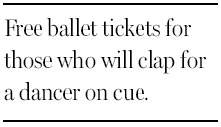The Bolshoi's covert system of guaranteeing wild applause
Updated: 2013-09-08 07:40
By Ellen Barry(The New York Times)
|
|||||||
MOSCOW - In the crowd that enters the Bolshoi Theater before the ballet, it is not hard to spot Roman Abramov and his team, as long as you know what you're looking for.
They are not the nouveau riche ones wearing gold brocade harem pants, or carrying hobo bags made out of tiny puffs of chinchilla. Their faces do not display the juicy satisfaction of officials' wives collecting what they are owed. Nor are they the gaping tourists in hiking boots, gaping up at the vestibule, with its gold-leaf-and-cotton-candy glow.
Mr. Abramov's people are middle-age Russian women in cloth coats, their expressions all business. As the first curtain approaches, they break into formations, like synchronized swimmers, and vanish into the stream of people heading to their seats.
Watching over all this is Mr. Abramov, whose job is to engineer applause and ovations, on the basis of secret agreements with dancers, using associates planted in the audience. These collaborations - part passion, part commerce - can go on for years; they can also sour into nasty, revengeful dramas.

Claqueurs, as these professional fans are known, were once common in the world's great theaters. Roman emperors had trained professionals to mingle with crowds at key moments, encouraging the dull roar of approval that speaks of a mandate. This behavior was refined in the theaters of 18th- and 19th-century France, where the term "claque" - from the phrase "to clap" - was coined.
At the Paris Opera, claqueurs became arbiters of success; Balzac writes in "La Comedie Humaine" that the chief of the claque had "the endorsement of the boulevard playwrights, all of whom have an account with him, as they would with a banker."
Today Mr. Abramov describes his work as a transaction: The claque provides artists with a guarantee of applause, and in return it receives free passes allocated to artists. Because the modern-day claque represents multiple artists in the same show, Mr. Abramov can often secure up to 28 seats in the theater on a given night, a remarkable fact given that tickets for a performance of "Swan Lake" sell for $300 to $500.
Some insiders contend that the claqueurs also profit by reselling passes, which Mr. Abramov categorically denies, saying the Bolshoi's administration traces the artists' passes, so a resale would be discovered and he would be immediately banned from the theater. The claqueurs' motivation, he says, is a simpler one: They are fanatics. Mr. Abramov and his associates enjoy closeness to the stars, and serve as ferocious defenders of the Bolshoi's conservative, classical tradition. They also need tickets.

But why do the artists need them?Mr. Abramov, who began frequenting the Bolshoi at 17 and is now in his late 40s, speaks of performers with a lack of awe. "Artists have very fine and delicate natures, they have a very delicate nervous system, and, unfortunately, all of them have a strongly inflated self-image."
In rare cases, a dancer takes the step of challenging the claque in public. In 2004, a newly minted prima ballerina, Maria Aleksandrova, infuriated Mr. Abramov and his team by saying she did not need their support.
A legendary feud arose between Mr. Abramov and the dancer Nikolai Tsiskaridze, who was quoted making similar comments. What ensued, both men agreed, was a campaign of revenge, mostly aiming to break the dancer's concentration at key moments in a performance.
When asked for details, Mr. Tsiskaridze smiled sweetly.
"One can start applauding at the wrong moment," said the dancer, whose contract at the Bolshoi ended this summer. "One can accidentally drop coins on a drum. Also, one can start laughing accidentally. One can start coughing - many people can start coughing at the same time, during a quiet scene. There is no law against it. You cannot do anything about it."
Mr. Abramov looked sympathetic when reminded of past disagreements with dancers. Yes, it is possible to clap off-rhythm when a dancer is performing the series of difficult turns called fouettes, he said.
But there was no time for regret this night, as "Swan Lake" hurtled toward its finale and shouts of "Bravo! Bravo!" emanated from a member of the team. As the ballerina was whipping off 32 perfect fouettes, the shouting came from everywhere.
Where the love ended, and deceit began, was impossible to tell.
The New York Times
(China Daily 09/08/2013 page12)